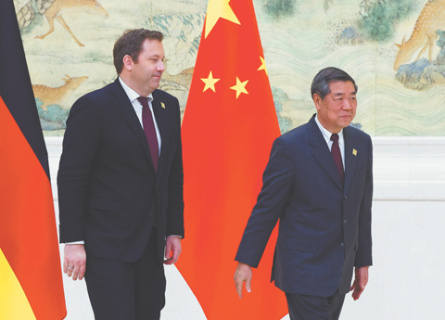
German Vice-Chancellor and Finance Minister Lars Klingbeil has embarked on a pivotal two-day visit to Beijing, marking the first high-level engagement from Germany’s current coalition government comprising the conservative CDU/CSU bloc and the Social Democratic Party (SPD). Klingbeil, a co-leader of the SPD, led a delegation of prominent German industrial and financial figures, signaling Berlin’s determined effort to navigate complex economic and geopolitical dimensions with China. His participation in the long-standing German-Chinese financial consultations underscored a clear intention to bolster economic ties between the two global powers, amidst an increasingly fractured international landscape.
This high-profile visit gains particular significance following the abrupt cancellation of Foreign Minister Johanna Wadefuhl’s planned trip to Beijing just days before its scheduled departure in late October. While Wadefuhl officially cited a lack of substantive meetings with Chinese officials, German media, including Stern magazine, widely attributed the cancellation to diplomatic friction. Specifically, concerns were raised over Wadefuhl’s more hawkish stance on Taiwan, reflecting the Christian Democratic Union’s (CDU) commitment to maintaining the “status quo in the Taiwan Strait”—a position often interpreted by Beijing as a de facto “two Chinas” policy, a perceived red line for the People’s Republic.
Sources close to Vice-Chancellor Klingbeil confirmed that his visit, despite the earlier diplomatic setback, received full clearance from both the German Foreign Office and the Federal Chancellery. This suggested a deliberate and coordinated effort by Berlin to engage Beijing. Intriguingly, the core agenda items Klingbeil aimed to address largely mirrored those intended by Wadefuhl, indicating a consistent German foreign policy line despite differing political affiliations within the coalition.
Foremost among the topics was the ongoing conflict in Ukraine. In Beijing, Klingbeil explicitly appealed to China to leverage its substantial influence over Moscow to facilitate a ceasefire and ultimately a peaceful resolution. His comments highlighted the international community’s hopes that Beijing could play a constructive, mediatory role in de-escalating the devastating war in Eastern Europe. While discussions on the highly sensitive issue of Taiwan were reportedly part of the initial agenda, German television correspondents covering the visit suggested this topic was likely omitted from formal talks, acknowledging Beijing’s extreme sensitivity on the matter.
Crucially, Klingbeil engaged Chinese Vice-Premier He Lifeng on pressing economic concerns, including Europe’s growing dependency on China for critical raw materials and semiconductors. He raised alarms over Beijing’s recently implemented export controls, particularly those affecting rare earth metals, which have already begun to impact German industrial sectors. The German envoy underscored that such restrictions pose a significant threat to the global economy, reiterating Germany’s steadfast advocacy for open and fair markets worldwide.
Concluding his discussions, Klingbeil reported that the Chinese side assured him they would thoroughly review the issue of rare earth metal supplies to Germany. Furthermore, both nations pledged to explore avenues for improved market access for their respective financial institutions. German political analysts interpreted the remarkably favorable reception accorded to Klingbeil by Chinese authorities as a clear indication of Beijing’s pragmatic desire to preserve and strengthen its economic ties with the crucial European market, rather than allowing political differences to sever these vital connections. The analysts also noted Klingbeil’s personal diplomatic approach, encapsulated by his mantra, “We must not talk about China, but with China,” as particularly conducive to productive dialogue.
However, the visit also casts a spotlight on the potential for parallel foreign policy tracks developing within Germany’s current coalition. Observers suggest that the Social Democrats, led by Klingbeil, might be pursuing a slightly different approach to China than their conservative counterparts in the CDU/CSU. This internal divergence presents a delicate challenge for Germany’s standing with its international partners and could, as analysts warn, be strategically exploited by external actors like Beijing to further their own interests and create leverage in bilateral relations.
